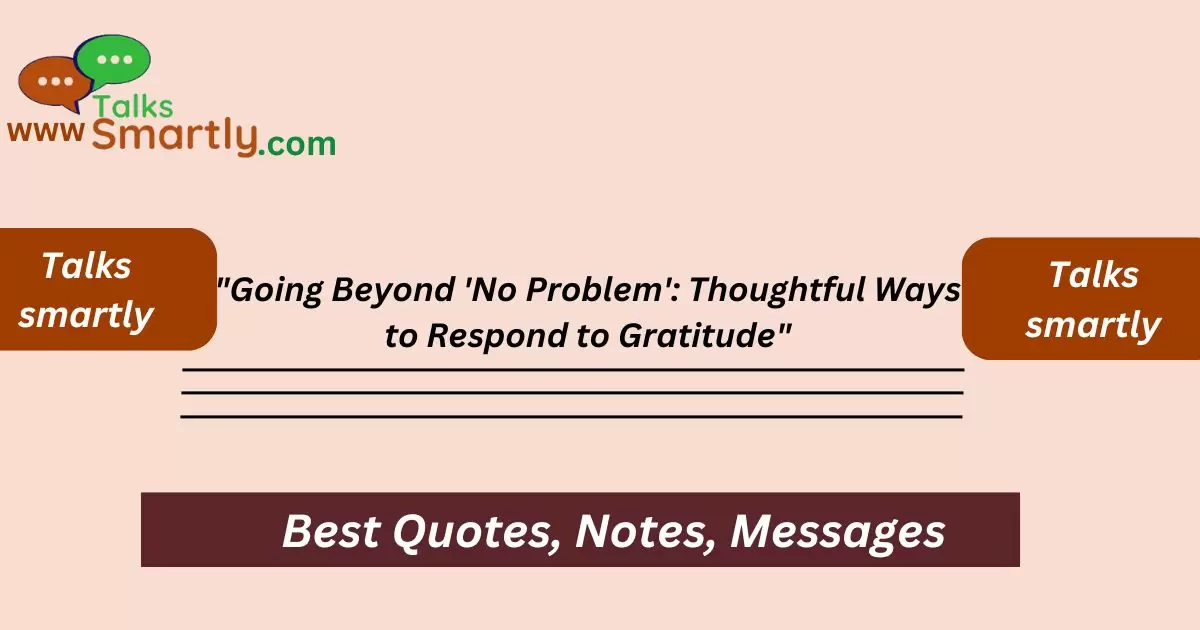Introduction
“Elevate your responses with sincerity and warmth. From “You’re welcome, it was my pleasure” to “I’m glad I could help,” discover meaningful ways to acknowledge gratitude graciously.”
Thanking someone is common, but responding thoughtfully can deepen connections. When someone expresses gratitude, our response matters. It shows appreciation and strengthens relationships. Crafting these responses effectively can make a lasting impact.
Next time someone thanks you, consider your response carefully. Your words can brighten someone’s day and foster a positive atmosphere. A thoughtful response can turn a moment of gratitude into a meaningful exchange.
In this article, we delve into strategies for crafting thoughtful and effective responses to gratitude. From simple acknowledgments to heartfelt appreciations, we explore how to convey sincerity and warmth in your responses. Discover practical tips and examples to enhance your communication skills in expressing gratitude.
How to Respond to Someone Who Is Projecting (With Examples)
Understanding the Context
- Gratitude in Social Interactions: Understanding why expressing gratitude matters in everyday interactions.
- Cultural Variations: How different cultures interpret and respond to gratitude.
- Psychological Impact: The positive effects of expressing and receiving gratitude.
- Digital Communication: Challenges and nuances of expressing gratitude online or via text.
- Professional Settings: How gratitude responses differ in professional environments.
- Personal Relationships: Tailoring responses based on the nature of the relationship.
- Frequency and Timing: When and how often to respond to gratitude expressions.
- Non-verbal Cues: The role of body language and facial expressions in conveying sincerity.
- Generational Differences: How responses to gratitude may vary across different age groups.
- Response Expectations: Managing expectations and societal norms around gratitude responses.
- Impact of Tone: How the tone of voice or writing style affects the perceived sincerity of a response.
- Educational Contexts: Gratitude responses in educational settings and their influence on student-teacher relationships.
- Social Media Etiquette: Guidelines for responding to gratitude on social media platforms.

- Expressions Beyond Words: Using gestures, gifts, or actions as responses to gratitude.
- Gender Differences: Any observed differences in how men and women respond to gratitude.
- Generosity and Reciprocity: How gratitude responses contribute to a culture of reciprocity.
- Emotional Intelligence: Enhancing emotional connections through thoughtful responses.
- Coping with Overwhelming Gratitude: Strategies for managing or responding to excessive gratitude.
- Public vs. Private Settings: Adjusting responses based on the setting or audience.
- Cultural Sensitivity: Avoiding misunderstandings or unintentional offense when responding to gratitude in diverse cultural contexts.
Beyond “No Problem” – Alternatives and Phrases
- Sincere Alternatives: Genuine responses that go beyond the conventional “no problem.”
- Appreciative Language: Using words like “you’re welcome,” “my pleasure,” or “glad to help.”
- Acknowledging Appreciation: Phrases that acknowledge the gratitude expressed.
- Personal Touch: Adding personal sentiments to your responses.
- Empathetic Responses: Expressing empathy and understanding in your replies.
- Acknowledging Impact: Reflecting on the positive impact of the interaction.
- Gratitude in Return: Responding with gratitude in return.
- Encouraging Further Communication: Inviting further interaction or collaboration.
- Tailoring Responses: Customizing responses based on the specific context or relationship.
- Humorous Responses: Using light humor to respond to gratitude.

- Formal vs. Informal Settings: Adjusting responses based on the formality of the situation.
- Avoiding Overused Phrases: Alternatives to common clichés in gratitude responses.
- Reflective Responses: Encouraging reflection or deeper thought in your replies.
- Expressing Commitment: Promising continued support or assistance.
- Sharing Positivity: Spreading positivity through your response.
- Educational Responses: Using responses as teaching moments or opportunities for learning.
- Expressing Gratitude for the Opportunity: Acknowledging the opportunity to help or be of service.
- Gratitude with Action: Combining words of thanks with actions or follow-up.
- Simple and Clear Responses: Keeping responses concise yet meaningful.
- Lasting Impressions: Crafting responses that leave a positive and lasting impression.
Tips for Choosing the Right Response
- Consider the Relationship: Tailor your response based on your relationship with the person expressing gratitude.
- Authenticity Matters: Ensure your response reflects genuine appreciation and sincerity.
- Contextual Awareness: Be mindful of the context in which the gratitude was expressed.
- Adapt to the Setting: Adjust your response based on whether it’s a formal or informal setting.
- Respond Promptly: Timely responses convey attentiveness and respect.
- Listen Carefully: Acknowledge the specific reason for gratitude to tailor your response accordingly.
- Use Positive Language: Frame your response in a positive and uplifting manner.
- Reflect and Review: Take a moment to reflect on your response before conveying it.
Conclusion
In summary, responding to gratitude should be simple and genuine. It’s about acknowledging the thanks with sincerity and showing appreciation in return. By choosing words carefully, we can make our responses more meaningful. Always remember, a heartfelt reply can strengthen relationships and leave a lasting impression.
Take a moment to think about how you respond when someone thanks you. Consider using personalized expressions of gratitude that reflect your appreciation. Whether in person or online, be mindful of the impact your words can have. Let’s make a conscious effort to craft thoughtful responses that resonate with those who express thanks.
In “Beyond ‘No Problem’ – Crafting Thoughtful and Effective Responses to Gratitude,” we explore strategies for responding to thanks in various situations. This article aims to enhance your communication skills by offering practical tips and examples.
Whether at work, with friends, or in everyday interactions, learning to respond graciously can enrich your social interactions. Discover how small changes in your responses can make a big difference in how you are perceived.












